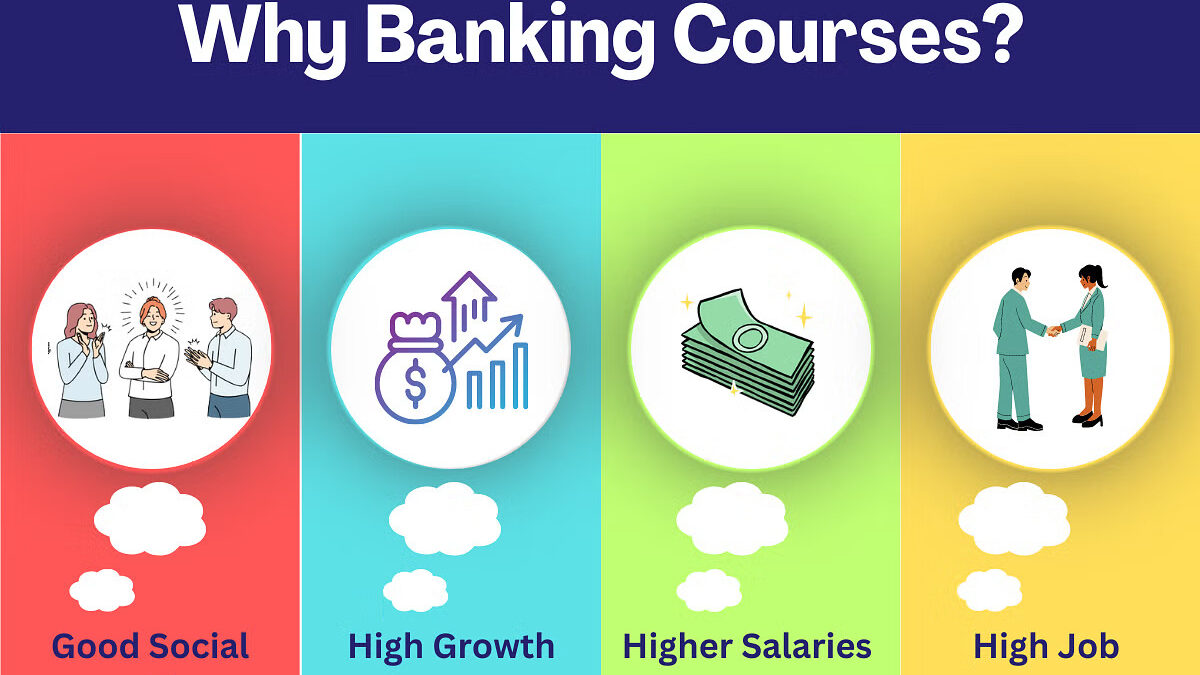Pursuing a Career in Banking: Opportunities After One Year of BCA? ‘
The banking sector is a dynamic and thriving industry that welcomes individuals from diverse educational backgrounds. If you have completed one year of a Bachelor’s degree in Computer Applications (BCA), you may be wondering about the prospects of entering the banking sector. This article explores the possibilities and requirements for applying for banking jobs after completing one year of BCA.

Full Form of BCA:
- BCA commonly stands for “Bachelor of Computer Applications.” It is an undergraduate degree program that focuses on computer science and its applications.
Understanding the Banking Sector’s Diversity: Unlike some industries that have rigid educational requirements, the banking sector is known for its diversity in hiring. Banks seek candidates with a range of educational backgrounds, including finance, business, economics, and even computer science-related fields. This diversity allows individuals with one year of BCA to explore opportunities in banking.
Relevant Skills and Transferable Knowledge: BCA programs typically equip students with a strong foundation in computer science, programming languages, and information technology. These skills are highly valued in the modern banking landscape, which relies heavily on technology and digital solutions.
Banking institutions are increasingly incorporating digital platforms, cybersecurity measures, and data analytics into their operations. Individuals with a BCA background bring valuable skills such as programming, database management, and IT infrastructure management, making them attractive candidates for certain banking roles.

Targeted Banking Positions:
While certain traditional banking roles may require a more extensive educational background in finance or business, there are specific positions within the banking sector that align well with the skills acquired during one year of BCA. Some potential roles include:
- IT Support Specialist: Banks heavily rely on IT infrastructure, and professionals with BCA qualifications can play a crucial role in maintaining and troubleshooting technical issues.
- Data Analyst: The banking industry generates vast amounts of data daily. Professionals with a background in BCA can analyze and interpret this data, providing valuable insights for decision-making processes.
- Cybersecurity Analyst: With the increasing threat of cyberattacks, banks prioritize securing their digital assets. Individuals with knowledge in cybersecurity, a common component of BCA programs, can find opportunities in this critical area.
- Fintech Developer: As financial technology continues to evolve, developers with a BCA background can contribute to the creation and enhancement of banking applications and digital services.
Educational Requirements and Additional Qualifications:
While a one-year completion of BCA is a starting point, certain banking roles may require further education or certifications. Consider pursuing additional courses or certifications in areas like finance, banking operations, or relevant programming languages to enhance your qualifications.

Networking and Internships:
Building a strong professional network and gaining practical experience through internships can significantly boost your chances of securing a banking job. Attend industry events, connect with professionals on networking platforms, and explore internship opportunities to gain firsthand experience in the banking sector.
While completing one year of a Bachelor’s degree in Computer Applications (BCA) is a significant achievement, it may be challenging to secure traditional banking roles that typically require a full bachelor’s degree for entry-level positions. Many banking positions, especially those in areas such as finance, banking operations, and management, often have minimum educational requirements that include a completed bachelor’s degree.
However, this doesn’t mean that opportunities are entirely closed for individuals with one year of BCA. Here are some considerations:
- Explore Tech-Related Positions: Given the increasing integration of technology in the banking sector, there may be opportunities for individuals with IT and programming skills. Positions like IT support specialist, data analyst, or cybersecurity analyst might be more accessible with a BCA background.
- Build Additional Qualifications: Consider enhancing your educational qualifications by completing your full BCA degree or pursuing relevant certifications in banking, finance, or IT. Additional qualifications can make you a more competitive candidate.
- Networking and Internships: Networking with professionals in the banking industry and seeking internships can provide valuable exposure and connections. Networking may lead to discovering niche opportunities where your BCA background can be an asset.
- Research Fintech and Digital Banking Roles: Explore roles within the fintech and digital banking sectors. These areas often value individuals with a strong IT background. Positions related to financial technology development, digital banking solutions, and data analytics may be more accessible.
- Consider Entry-Level IT Roles: Look for entry-level IT positions within banking institutions. Starting in a more technical role could be a stepping stone toward transitioning into other areas of banking as you gain experience.
- Continuous Learning: Stay informed about industry trends, financial technologies, and emerging technologies relevant to banking. Continuous learning and staying up-to-date with the latest advancements can make you a more attractive candidate.
It’s crucial to be flexible and open to different paths within the broader banking and financial services industry. While some roles may require a completed bachelor’s degree, others may place more emphasis on practical skills and experience. Tailor your job search to positions that align with your current qualifications and skills while remaining open to opportunities for further education and skill development.


BCA – Jobs, Scope & Salary in India
Companies throughout the world are using computer software and applications, thus the need to BCA course graduates is rising for every industry. as a BCA graduate, you will be able to get started with a lot of jobs, which we are going to discuss here, along with the average salary brackets they come along.
If you are a BCA graduate, you will have a lot of job opportunities and job profiles to choose from. It is on you that which job you wish to go ahead with and the deciding factor can be your area of interest or what salary package attracts you the most. Also, not every city as the right balance of opportunities. So, depending upon which city you wish to settle down in, you can choose you field.
Banking, system administration, computer programming, software, networking engineering, and web designing are some of the most chosen fields, but this is not the end of the list. Whether you are a fresher or a professional, here are some of the job profiles you can wish to move ahead with –
- Computer Programmer
Average salary in India – INR 4.9 LPA







